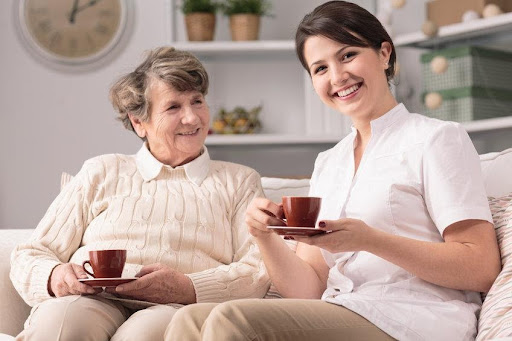
Top 10 Skills of an In-Home Caregiver
Suppose you imagine what life is like for a senior citizen with a memory disorder or an illness that keeps them homebound or bedridden. In that case, you may recognize the heartbreaking heaviness of their life changes. Apart from the physical changes, many Visiting Angels Farmington, New Mexico clients suffer from low self-esteem, sadness, anger, or loneliness. Emotional changes are as powerful as physical changes.
When it comes to extra care for an older adult, caregivers shouldn’t be robotic and unempathetic. Instead, they need a human – someone who empathizes and genuinely cares. Many families are opting for in-home companionship care, allowing their aging loved ones to receive care from the comfort of their homes. As this type of care becomes more in-demand, our team is more in need of caregivers who are not only reliable and competent but can help these families transform their elder care for the better.
If you are looking to become an in-home caregiver, the following are our recommendations for the top 10 needed skills for the job.
Observation
Sometimes, seniors can’t articulate what’s wrong with their health. An observant caregiver can recognize minor changes. They keep a sharp eye for differences in their client’s condition. They also report every little change in the client’s environment to help reach a viable diagnosis.
Effective Communication
Caregivers must possess efficient communication skills, both verbal and written. Sometimes, the client cannot interact through traditional means. However, the caregiver should know how to transmit the feelings of the client to family members and physicians.
Time Management
Whether you are a member of the team at Visiting Angels Farmington, NM or working as an individual, you’ll have various tasks and a limited time to complete them. Our team members know how to prioritize tasks, work efficiently, and avoid being bogged down by time-consuming duties.
Positive Demeanor
Caregivers need to recognize that a negative attitude could be detrimental to their client’s health. Clients, especially ones with physical or mental impairments, are prone to feel depressed or defeated due to their health. An in-home caregiver should have a positive attitude because an optimistic outlook will help their clients feel rejuvenated and hopeful.
Patience
Being an in-home caregiver is rewarding and testing at the same time. You may not be able to follow the pace you anticipated. Anger, confusion, or depressive episodes some clients face could become frustrating if you don’t embrace the virtue of patience. As an in-home caregiver, you should know how to handle such situations calmly and toss frustration out of the window.
CPR Training
CPR training is highly recommended for in-home caregivers, although not necessarily required. The American Heart Association says CPR can double or triple the survival of out-of-hospital cardiac arrests. With CPR training, you’ll be prepared for any issues that arise and will know how to keep your clients calm and safe until help arrives.
Physical Stamina
Caregivers perform a spectrum of physical tasks. From carrying groceries to helping individuals with mobility issues, caregivers must stay on their feet for long periods. Having a baseline level of stamina is essential to ensure that you provide the best possible care to your clients.
Cleanliness
Sometimes, a caregiver must provide light housekeeping services to their clients (for example, laundry or mopping). And at times, they must attend to the client’s personal hygiene needs, for example, bathing and getting dressed. It’s helpful to know the best ways to clean and be comfortable helping with personal hygiene.
Problem-Solving Skills
Caregiving could bring about some events that you never anticipated. Make sure you have the mental clarity to think on your feet and create new plans. Instead of panicking due to a modified schedule, a caregiver should know how to pivot!
A Willingness to Listen to Understand
A good caregiver pays attention. They observe their client’s cues and know how to respond accordingly. More importantly, a good caregiver listens to their clients to hear and understand what they need, which will keep client frustration at bay.
Join The Visiting Angels Farmington Team
A good home caregiver knows how to deliver in-home care professionally and empathetically. For this, you need to develop resilience and creativity. If you have some of these traits and want to pursue a career in senior care, we want to hear from you! Visit us online to apply! We’re excited to hear from you!
